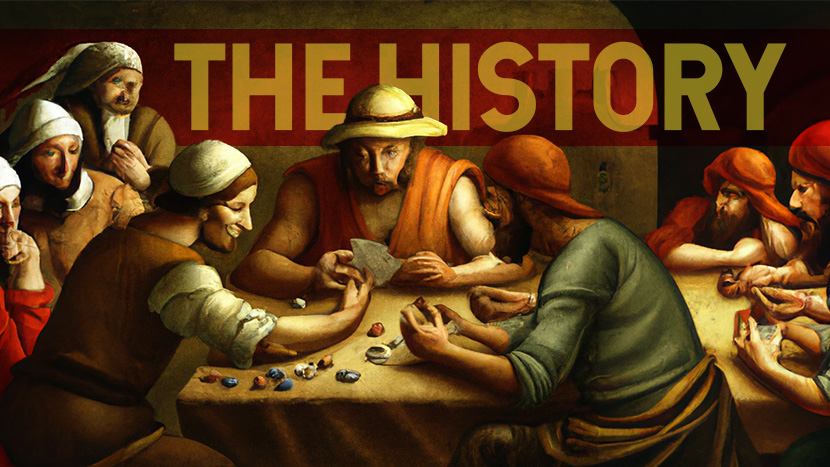syriancastles.com – Gambling has been a part of human civilization for centuries, captivating individuals with its allure of risk and reward. It is a practice that transcends time, culture, and geographical boundaries. From ancient civilizations to our modern digital age, the evolution of gambling has been a fascinating journey. In this article, we will explore the history of gambling and how it has transformed over time, from its humble beginnings to the thriving industry we know today.
The History of Gambling
Ancient Gambling Practices
The roots of gambling can be traced back to ancient civilizations. The earliest evidence of gambling dates back to around 3000 BC in Mesopotamia, where six-sided dice made of bone were discovered. The Mesopotamians used these dice to play a game called “The Royal Game of Ur,” a precursor to modern board games. Gambling was not only a form of entertainment but also had religious and mystical significance in ancient cultures. For example, the ancient Egyptians believed in the power of chance and used dice to predict the outcome of events.
As civilizations progressed, so did gambling practices. The ancient Greeks and Romans were avid gamblers, betting on everything from athletic competitions to chariot races. These early gambling activities laid the foundation for the development of more complex games of chance in the future.
Gambling in Medieval Times
During the medieval period, gambling took on new forms and became an integral part of social life. Popular games of the time included dice games, card games, and various board games. However, gambling was not always welcomed by authorities, and laws were enacted to regulate and sometimes even ban gambling activities. Despite these restrictions, gambling continued to thrive in secret places, such as underground taverns and private residences.
The Rise of Casinos and Gambling Houses
With the dawn of the Renaissance and the Age of Enlightenment, gambling underwent a significant transformation. The establishment of casinos and gambling houses became more prevalent, offering a controlled environment for gamblers to indulge in their passion. In 17th century Italy, the Ridotto, a government-sanctioned gambling house, was established in Venice. The Ridotto paved the way for the modern casino, setting the stage for the grand gambling establishments we know today.
The 19th century witnessed a surge in gambling popularity, particularly in the United States. The frontier towns of the Wild West became notorious for their saloons and gambling halls, attracting adventurers and fortune-seekers from all walks of life. The introduction of roulette wheels, poker tables, and slot machines added a new level of excitement to the gambling experience.
The Impact of the Industrial Revolution on Gambling
The industrial revolution of the 18th and 19th centuries brought about profound changes in society, and gambling was not immune to its effects. The rise of urbanization and the growth of the middle class created a demand for new forms of entertainment. Gambling, with its promise of wealth and excitement, became increasingly popular among the working class.
As technology advanced, so did the gambling industry. In the late 19th century, the invention of the telegraph enabled bookmakers to transmit odds and results quickly, revolutionizing sports betting. Lotteries, which had been around for centuries, became more accessible to the general public, thanks to the introduction of printing presses and the postal system.
Gambling in the Digital Age
The Emergence of Online Gambling
The digital revolution of the late 20th century brought about a seismic shift in the gambling landscape. With the advent of the internet, online gambling platforms began to emerge, offering convenience and accessibility like never before. Players could now enjoy their favorite casino games, place sports bets, and participate in lotteries from the comfort of their own homes.
Online gambling opened up new possibilities for the industry, attracting a global audience and generating enormous revenue. Advances in technology, such as secure payment systems and advanced graphics, enhanced the online gambling experience, making it more immersive and realistic. Mobile gambling further expanded the reach of online gambling, allowing players to wager anytime and anywhere.
The Future of Gambling
As we look to the future, the evolution of gambling shows no signs of slowing down. The integration of virtual reality and augmented reality into gambling experiences is on the horizon, promising to transport players into virtual worlds where they can interact with their favorite games in unprecedented ways. The rise of cryptocurrencies, such as Bitcoin, has also begun to shape the gambling industry, offering secure and anonymous transactions.
Regulation and responsible gambling practices will continue to play an essential role in the future of gambling. Governments and gambling authorities are increasingly recognizing the need to protect players and prevent addiction. Striking the right balance between innovation and responsible gambling will be crucial to ensuring the sustainability and growth of the industry.
Conclusion: The Ongoing Evolution of Gambling
From ancient dice games in Mesopotamia to the immersive online casinos of today, gambling has come a long way. Its evolution has been shaped by advancements in technology, changes in societal attitudes, and the innate human desire for excitement and risk. As we embrace the digital age, we can only imagine the possibilities that lie ahead for the gambling industry. One thing is certain: gambling will continue to evolve, captivating and entertaining us for generations to come.
